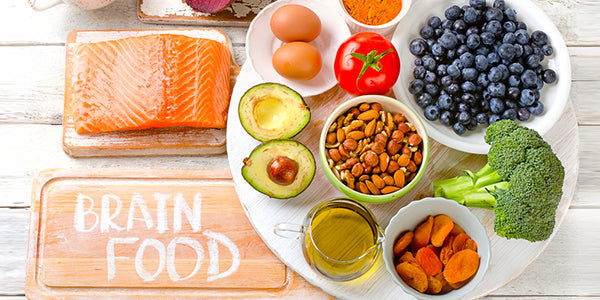
Using food as medicine is much more than promoting physical health and alleviating ailments and conditions. A substantial body of research has linked diet and mental health and undermining its importance can tarnish the vigor of the brain.
The Link Between Good Nutrition and Mental Health
The brain requires adequate fuel to sustain and grow its strength, sharpness, and overall health. Unfortunately, the nutrients the brain needs are stripped away in the Americanized food supply and culture, which leaves a heavy eating pattern of simple sugars, refined carbs and vegetable oils.
An eye-opening study published in the British Journal of Psychiatry investigated the association between dietary patterns and depression. Involving almost 3,500 middle-aged participants, researchers found those who consumed a diet rich in vegetables, fruits and fish had lower rates of depression compared to those with a higher consumption sweetened desserts, fried foods, processed meats, refined grains, and high-fat dairy products.
Furthermore, a poor diet increases the risk of obesity, only postulating the risk of depression, anxiety, and mood disorders.
Recommended Foods for Mental Health
Overall, the solution to boosting brain health with food relies on going back to basics and for foods that are naturally colorful.
So rather than going for boxed products prepared in large manufacturing plants, incorporate more wholesome and colorful foods, including whole grains, fresh fruits and veggies, lean and plant-based proteins, and healthy fat sources.
Furthermore, the following nutrients have been regularly studied and advocated for their renowned implications on mental health:
Antioxidants
Sourced from: A wide variety of food-based substances such as beta-carotene (apricots, carrots, and sweet potatoes), lutein (eggs and green, leafy veggies), lycopene (grapefruit, tomatoes, and watermelon), polyphenols (coffee, dark chocolate, and tea), resveratrol (blueberries, grapes, and red wine), vitamin C (bell peppers, citrus fruits, and strawberries) and vitamin E (almonds, peanuts, sunflower seeds, and corresponding nut and seed butters)
Simply put, antioxidants are compounds that protect cells from damage. Foods supplying antioxidants have shown to prevent age-related neurodegenerations and the resulting changes of cognitive and motor function, including protecting against dementia and depression.
Fiber
Sourced from: apples, berries, broccoli, green split peas, beans, lentils, almonds, and whole grains such as wheat and oats
Fiber works multifactorial for promoting mental health, including by reducing inflammation in the brain and stabilizing blood sugars for mood regulation. Furthermore, diets low in fiber have been linked to higher rates of depression and suicide.
Folate
Sourced from: beef liver, spinach, broccoli, asparagus, black-eyed peas, and fortified breakfast cereals
Folate is critical for making DNA and neurotransmitters, along with being absolutely critical for proper formation of the nervous system during development. Furthermore, folate deficiency is associated with depression and dementia.
Iodine
Sourced from: milk and dairy products, fish, shellfish, meat, poultry, and eggs
Iodine is required for optimal thyroid function and proper brain and nerve development and formation. Furthermore, the Linus Pauling Institute indicates iodine deficiency is recognized as the most common cause of preventable brain damage in the world.
Omega-3 Fatty Acids
Sourced from: fatty fish (especially halibut, salmon, and tuna), flaxseed, walnuts, and grassfed beef
Omega-3 fatty acids have a prominent role in brain health and may even treat and manage various mental disorders, including depression and bipolar disorder. Researchers have found cultures that eat foods with high levels of omega-3s also have lower levels of depression.
In addition to mental health promotion, omega-3s may protect the brain against Alzheimer’s disease and dementia, mostly by protecting the brain cells against harmful damage. Brain cells with heightened levels of omega-3s are suggested to improve and maintain learning and memory in adults.
Vitamin B12
Sources from: meat and meat products, fish and shellfish, milk and dairy products, and fortified ready-to-eat cereals and plant-based milks
Also known as cobalamin, vitamin B12 is recognized as an energy powerhouse, helping to make DNA, nerves, and blood cells, functions imperative for keeping a healthy brain and strong immune system.







